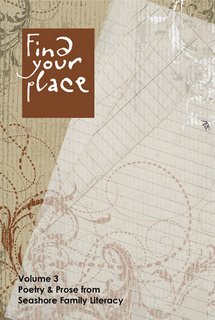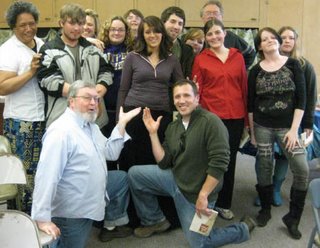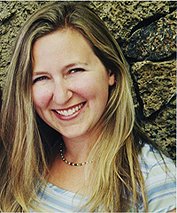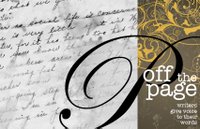As my first guest, I welcome Sage Cohen, the author of
Writing the Life Poetic: An Invitation to Read and Write Poetry, and the poetry collection
Like the Heart, the World. Cohen teaches the online class
Poetry for the People, and is editor of
Writing the Life Poetic Zine. She lives in Portland, Oregon with her husband and infant son.
You’ve been published in dozens of journals and anthologies, won first place in the Ghost Road Press contest, were awarded a fellowship to attend New York University, and have taught poetry at universities, hospitals and writing conferences. Yet, even with all those credentials, you have said that you could not get a publisher for your book of poems, Like the Heart, the World. That’s disheartening news for the rest of us. Can you share your experiences and tell us about your decision to self-publish?
Disheartening? I sure hope not! I did not say that I could not get a publisher for my book of poems. What I said is that I chose another path—one that felt more empowering, more fun, and more expedient than waiting for someone else to publish me!
Before deciding to self publish, I spent about a year sending my manuscript out to a handful of publication contests. (Most poets expect to send their work out for many years before it gets published—if ever.) It placed as finalist or semi-finalist four times, which was exciting. That was enough validation for me...I didn't want to spend any more time waiting for someone to choose my book for publication. I felt a sense of urgency to have that body of work in the world, and to have it look and feel exactly the way I wanted. I've spent years creating marketing communications materials for clients, and I always enjoy the opportunity to design and produce my own pieces. So I hired my favorite illustrator/designer to layout the book and create the cover, and within a few months, had a finished product in my hands.
It was very empowering deciding that my book was ready to be born, and then making it happen. The poems in Like the Heart, the World span more than 15 years and reflect time periods and thematic cycles in my life that felt complete. With this publication, I feel that they've been well honored, which gives me more breathing room to embrace the poems of this life chapter.
I hope that my experience will remind other poets who feel helpless about the poetry publishing waiting process that they have options. We can decide when our manuscripts are ready to go forth into the world as books, and we can do that however we like...the traditionally prescribed way or our own way.
Last month, during National Poetry Month, you wrote a poem every day. How did that commitment shape, or reflect, your writing practice?
I love setting ambitious—and even unrealistic—goals for myself like that one. When I write on a deadline, with a goal of just getting something down on the page, it gets me out of perfection mode and into production mode. That’s where the real juice is for me: in the mosh pit of making poetry happen. I started my sagesaidso.typepad.com with a similar intention. Every day for a year, I wrote something new and posted it. I highly recommend the exercise. You’re likely to surprise yourself with how much you have to say—and how well you are able to say it!
Your classes and your book incorporate poetry examples, using a wide range of styles and poets from which to learn. Do you read poetry on a regular basis? Who has influenced your writing life?
I read poetry as much as possible! It is like food for me: something I need to keep ticking.
My influences started close to home with my mother, an English teacher, honing my writing and editing skills. My father saw the spark and named the “writer” archetype in me. My teacher Albert Cwanger in sixth grade affirmed my creative intelligence. And my teacher Matthew Carr in high school was the matchmaker in my love affair with literature. From there, every poet and writer I’ve ever read has awakened some new possibility in me. I am grateful for the incredible wealth of genius available to all of us in books.
As a teacher, what do you look for in a poem?
I always look for what is most alive—and focus on how to bring that forward in a poem. I think when students are aware of and engaged with what they do well, their poems can make great leaps forward.
What are your favorite poems and why do you like them?
That’s a hard one—like trying to name every street in my favorite country. Stanley Kunitz’s poem “Touch Me” is the one that bubbles up to the surface right now. It is a poem about nature, about love, about aging—about that edge we all walk—one of joy laced with its disappearance. This is what I come to poetry for: the chiaroscuro of language that gives shape and meaning to our experience.
Touch Me
Summer is late, my heart.
Words plucked out of the air
some forty years ago
when I was wild with love
and torn almost in two
scatter like leaves this night
of whistling wind and rain.
It is my heart that's late,
it is my song that's flown.
Outdoors all afternoon
under a gunmetal sky
staking my garden down,
I kneeled to the crickets trilling
underfoot as if about
to burst from their crusty shells;
and like a child again
marveled to hear so clear
and brave a music pour
from such a small machine.
What makes the engine go?
Desire, desire, desire.
The longing for the dance
stirs in the buried life.
One season only,
and it's done.
So let the battered old willow
thrash against the windowpanes
and the house timbers creak.
Darling, do you remember
the man you married? Touch me,
remind me who I am.
— Stanley Kunitz
from Collected Poems
In your book and in your classes, you encourage community. Can you tell us more?
Yes! I believe that for many of us, poetry is more powerful and more possible in community. So I've created a number of ways to keep a dialogue going with poets and writers everywhere. You can join in the Writing the Life Poetic conversation at my blog.
I also just launched the very first issue of the Writing The Life Poetic Zine, a free monthly publication featuring the panoramic wisdom of ten Portland poets. The zine offers writing prompts, publishing markets, interviews, wisdom and tips about cultivating a writing life and community, and more! If you'd like to receive a monthly muse infusion, just visit writingthelifepoetic and enter your email in the top right box where it says "Sign up for our email newsletter."
And finally, feel free contact me directly at sage@writingthelifepoetic.com
Sage Cohen will present a free poetry workshop in Newport, Oregon on Tuesday, June 2 from 7 to 8:30pm at the Newport Public Library. This is a Willamette Writers event.









